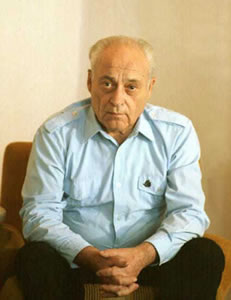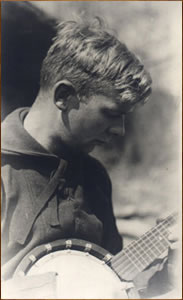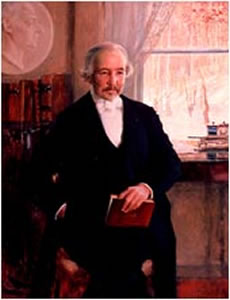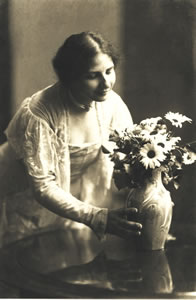|
De Russische schrijver Anatoli Rybakov werd geboren op 14 januari 1911 in Tsjernihiv. Zie ook mijn blog van 14 januari 2009 en ook mijn blog van 14 januari 2010.xml:namespace prefix = o ns = "urn:schemas-microsoft-com:office:office" />
Uit: The Children of the Arbat
This was the reasoning of an emigre who did not know Russia or the Russian village or the peasant. What had happened to the famous electric plow that Lenin had gazed on with such naive hope in 1922? Where was it now? It wasnt that Lenin didnt understand technology, just that he didnt understand the Russian village and the Russian peasant. In order to make the peasant literate and cultured and in order to safeguard the village from famine and so on, we needed not decades but centuries.
That approach, the approach that tried to inculcate the psychology of the farmer, was alien to the peasant. The farmer didnt need the dictatorship of the proletariat. The farmer, the private farmer and the individualist, has to be stifled at birth in the Russian peasant. As for cooperatives, by all means, but the kind in which the peasant will be a simple worker. Thats what he had accomplished: the second Russian revolution, and it was no less important than the first one.
In the October Revolution we had the peasants on our side, and in the collectivization we had them against us. Yes, of course we need books and science and protection against crop failure, but we need all that, not as preliminaries of collectivization, but on the basis of it. Lenin had said: first culture, then collectivization. Stalins way was: first collectivization, then culture.

Anatoli Rybakov (14 januari 1911 23 december 1998)
De Duitse dichter en schrijver Werner Helwig werd op 14 januari 1905 in Berlijn geboren. Zie ook mijn blog van 14 januari 2009 en ook mijn blog van 14 januari 2010.
Uit: Isländisches Kajütenbuch
Husavik, grau und sauber ins dünne Grün seiner Wiesen gesetzt, verschwand hinter uns. Das Meer sank sichtlich in die Tiefe zurück, während der Horizont mehr und mehr anstieg. Nach drei Stunden Fahrt dampfte unser Kühler wie ein Samowar, und wir mußten einen Teil unseres Sodavorrates für ihn opfern, da hier die Quellen so eigensinnige Wege nahmen, daß wir sie nicht erreichen konnten. Endlich hatten wir das Hochland vor dem Wagen.
Ein baumloses Gelände, braungrün getönt, von niedrigen Hügelbergen durchzogen, breitete sich rundhin aus. Die Straße verlief in weichen, oft unkenntlichen Linien durch lehmige Löcher und Kulen. Hier gab es dann Wasser genug in Form von ausgedehnten Pfützen. Es peitschte uns durch die zersprungene Windschutzscheibe ins Gesicht. Auf immer noch leicht geschrägter Ebene stiegen wir an. Die Dämmerung ließ Schleier von Nebel auf uns nieder. Der Sichtkreis war schließlich auf fünf Meter beschränkt. Ruckend und hüpfend humpelte der getreue Wagen dahin und mit ihm humpelten und hüpften unsere gepeinigten Leiber.
"Jetzt ist Nacht", murmelte Brygg, und da es keineswegs der Tatsache entsprach, wollte ich ihn verwundert anschauen, was mir aber nicht gelang, da die hüpfende Wagendecke ihm den Diplomatenhut bis auf die Nase ins Gesicht getrieben hatte. Ich zog die Bremse und korrigierte seinen Anzug. Er bearbeitete in schweigendem Verdruß die Islandkarte, die er aus der Tasche der Wagentür gezogen hatte.

Werner Helwig (14 januari 1905 4 februari 1985)
Helwig met banjo, 1929
De Finse dichter en schrijver Zacharias Topelius werd geboren in Nykarleby op 14 januari 1818. Zie ook mijn blog van 14 januari 2009 en ook mijn blog van 14 januari 2010.
Uit: Times of Gustaf Adolf
EVERYBODY in Wasa who had life and feet had gone down to the harbor to enjoy the uncommon spectacle of a man-of-war. Five or six hundred people lined the shore, rowed out in boats, or climbed the masts of the vachts or the roofs of the store-houses to get a better view. Two hundred recruits regarded with mingled curiosity, fear, and pride, the vessel which was to take them from their fatherland, perhaps forever; and behind them stood a large group of mothers, sisters, and sweet-hearts, shedding bitter tears at the thought of the approaching separation.
The governor, Ulfsparre, was away in Sweden. His lieutenant, Steward Peder Thun, with his garrison, received the new-comers; the recruits formed a row on both sides, and the captain of the " Maria
Eleonora " offered his arm politely to Lady Regina, to escort her to Korsholm. But at this moment the proud young girl remembered that she was a prisoner; she refused the officer's arm, and walked alone, with a princely bearing, followed by her old serva'nt, through the ranks of the recruits and the
staring crowd.
Such an unusual sight put all Wasa in a terrible state of curiosity. In an instant there arose and spread the strangest reports about her.
"She is a princess of Austria," said some; "the emperor's daughter, taken prisoner during the war, and sent here for safety." Others pretended to recognize in her the Queen Maria Eleonora; but why did she come to Korsholm?
" I will tell you," whispered a tinker, with an important air. "She is in league with her German countrvmen against the king and the country, and therefore she is to be imprisoned in this remote and secure fortress of Korsholm."

Zacharias Topelius (14 januari 1818 12 maart 1898)
De Nederlandse dichter en schrijver Isaäc da Costa werd geboren in Amsterdam op 14 januari 1798. Zie ook mijn blog van 14 januari 2007 en ook mijn blog van 14 januari 2009 en ook mijn blog van 14 januari 2010.
Wachter! Wat is er van den nacht? (Fragment)
De wereld onzes tijds, met weten ingenomen
Zoo als geen vroegere ooit, zuigt in haar dorst by stroomen
De vrucht der drukpers in, die gistend tot ons komt
En hoofd en hart om strijd of prikkelt of verstompt.
Geen boeken evenwel die deze dorst verzaden!
Neen! op der stormen vlerk, gelijk de orakelbladen
Der Pythonis, gevoerd, of liever, over volk
Aan volk van uit den schoot der bliksemzwangre wolk
By vlagen neêrgedaald, brengt Kennis en Beschaving
Ons menschdom, uur aan uur, in 't Vlugschrift versche laving!
Een breede plas van licht, die de oogen scheemren doet!
Een even snel vergaan als weêr gewassen vloed!
Een zee van letters, waar, by 't zweepen van de winden,
Steeds vreemder schaduwen op rijzen en verzwinden
In allerhande vorm, - en dan op eens één beeld
(Het uwe, o Geest des tijds!) zich afdrukt en herteelt
Vollediger, dan of Daguerre 't onder 't zweven
Bespied had, aangelokt, en op zijn vlak doen kleven.
Is 't waar? en wordt by 't zweet der rustelooze pers
Door Vlugschrift en Journaal naar 't leven steeds en versch
Het beeld, de stem des Tijds herbaard? zijn zin, zijn pogen,
Beloften, dreigingen, vermeten en vermogen,
Ons ieder dag verhaald? van ieder nieuwen stap
Die ter volmaaktheid voert, verslag en rekenschap
Gebracht? zoo sta het vrij die godspraak te ondervragen!
Ja, by het kroost der Pers zich met de vraag te wagen,
Die uit het binnenst roept: Wat is er van den nacht,
o Wachter! welk een dag wordt aan de kim gewacht?

Isaäc da Costa (14 januari 1798 28 april 1860)
Da Costakade in Amsterdam
De Duitse dichteres en strijdster voor vrouwenrechten Ida Dehmel werd geboren op 14 januari 1870 in Bingen. Zie ook mijn blog van 14 januari 2007 en ook mijn blog van 14 januari 2009 en ook mijn blog van 14 januari 2010.
Uit: Ida und Richard Dehmel - Harry Graf Kessler. Briefwechsel 1898-1935
Lieber Herr Graf!
Wir sind schon mitten in unsrer Vortragsodyssee, und nähern uns immer mehr Weimar. Ich nehme an (Dehmel liest heute in Karlsruh, und hat mich gebeten, Ihnen zu schreiben) also wir nehmen an, daß Sie Ihre Einladung damals durchaus ernstlich meinten wenn wir auch den von Ihnen zugesagten Brief nicht erhalten haben. Ich habe damals gleich an Frau Förster-Nietzsche geschrieben; Sie war ganz damit einverstanden, daß wir diesmal bei Ihnen wohnen. Nun bitte ich Sie freundlichst um ein Wort, ob wir Ihnen am 10ten vormittags recht kommen; (den Zug würden wir Ihnen noch mitteilen). Wir können bis zum 14ten bleiben. Hauptmanns wollten gleichzeitig hinkommen; Sie werden sie wohl vorher noch bei der Hofmannsthalschen Première [Ödipus und die Sphinx sprechen.
Unsre Adresse bleibt bis zum 7ten Mannheim, L. 12. 18.
Mit freundlichem Gruß

Ida Dehmel (14 januar 1870 - 29 september 1942)
|



